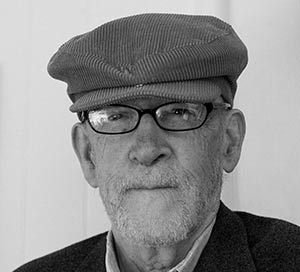Ekphrastic Songs, Finding One Self; Music by Paul Salerni ’73; Poems by David Ferry ’46

For composer Paul Salerni ’73, inspiration for two recent song cycles came from the pages of this very magazine.
In fall 2015, while catching up at the breakfast table on past issues of Amherst, he read Tess Taylor ’00’s interview with poet David Ferry ’46 (“Kind of a Love Story,” Summer 2011). Intrigued, he looked up Ferry’s poems online and decided to set some to music. He later called Ferry to request permission to use four poems.

“I was delighted to hear from him,” says Ferry, who got the call early in 2016. The poet had previously had some of his work set to music by composer Rodney Lister, who turned out to be a friend of Salerni’s.
“They admire one another,” Ferry says, “and I admire them.”
While they talked, Ferry pointed out to Salerni that three of the four poems are ekphrastic—that is, they describe visual works of art—and that the fourth is about personal identity.
That conversation led Salerni to compose songs inspired by three more of Ferry’s works, and to divide the seven songs into two thematic cycles: Ekphrastic Songs (based on “Harvesters Resting,” “Cythera” and “Civilization and Its Discontents”) and Finding One Self (“A Charm,” “A Young Woman,” “Who Is It?” and “Roman Elegy VIII”). Both cycles will be available on CD next year.
“Sometimes I simply start with the melody suggested by the words,” Salerni says of his composing process. “Sometimes I try to capture what is suggested by a concrete musical image in the poem.” In “Civilization and Its Discontents,” for example, Ferry writes of “the great engraving of the great painting / Fête Vénitienne, entangled in / The entrapment of the scription, as if in vines.” To Salerni, a Venetian feast suggested “Renaissance lute music that might be updated for the modern guitar and singer.”
In the same poem, Ferry talks about artist Jean-Antoine Watteau pretending to play the bagpipe—“another musical sound to incorporate,” Salerni says. Each poem is “already musical” when it’s merely spoken, Ferry points out. He says Salerni’s songs are “faithful readings of the measured spoken lines, and the music keeps assuring us that the spoken lines have been heard and interpreted.”
Ekphrastic Songs has been performed twice by New York’s Bowers-Fader Voice and Guitar Duo—first in October 2016 and again in January 2017. Both cycles will be featured in September at a concert at Lehigh University, where Salerni is the NEH Distinguished Chair in the Humanities and Professor of Music. “I wouldn’t miss it for the world,” says Ferry.
The composer and poet have stayed in touch. “We met at Matt Murphy’s Pub in Brookline [Mass.], David’s ‘hangout,’ a special place to him because a poem of his is painted above the wainscoting on the four walls of the pub,” Salerni says.
Salerni’s earlier work includes, among many other projects, the one-act operas Tony Caruso’s Final Broadcast, winner of the National Opera Association’s Chamber Opera competition, and The Life and Love of Joe Coogan, based on an episode of The Dick Van Dyke Show. On a recent sabbatical in Vicenza, Italy, he worked on arrangements of songs by German composer Kurt Weill; a piece for “narrator, young string players, children’s chorus and full symphonic orchestra” based on an Italian fable; and an adaptation of the poem “Haunted” by Dana Gioia.
Katherine Duke ’05 is the magazine’s assistant editor.
